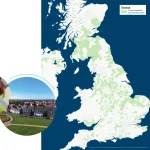Government Mulls Regional Franchises to Boost Full Fibre Broadband
A newspaper report has claimed that the UK government’s on-going ‘Telecoms Infrastructure Review‘ is giving serious consideration to the old idea of adopting regional franchises, which they claim might help boost the coverage of “full fibre” (FTTH/P) broadband, particularly in rural areas.
At present it’s widely known that both the Government and Ofcom are deeply dissatisfied with Openreach’s (BT) commitment toward ultrafast 1Gbps capable “full fibre” (here). The operator intends to rollout FTTP to 3 million premises by 2020 and they’re also trying to figure out how to meet an aspiration of 10 million premises by around 2025, which is very difficult due to the regulatory baggage they’ve been forced to carry (some of the key regulatory or market changes being proposed by Openreach may not come to pass).
As a result the government appears to be considering the possibility of regional franchises. According to The Telegraph (paywall), discussions are at an early stage and have already recognised the potential for “major hurdles,” including concerns that “creating regional monopolies could bring new complications and problems similar to those suffered on the rail network since its franchise system was introduced.”
Advertisement
Nevertheless officials suggest that franchising could be used to ensure that more rural areas do not miss out on broadband infrastructure investment. Meanwhile densely populated towns and cities, where the commercial model is easier to make due to dense populations, could be bundled together with swathes of less profitable countryside.
A Spokesperson for DCMS said:
“We want full fibre, gigabit connectivity to be widely available to UK homes and businesses. The Future Telecoms Review underpins our plan to build a Britain fit for the future, and we are looking at all options to drive commercial investment and boost competition.”
At this stage there isn’t really enough information for us to accurately analyse what is being considered (the devil will be in the detail). The big problem with FTTH/P is that it’s hugely expensive and takes a very long time to deploy, although it’s not unrealistic to expect that commercial operators might (eventually) be able to deploy the service to around half of the UK.
However, going further than around 40-60% of the UK (i.e. mostly the low hanging fruit of urban areas) is still likely to require significant support from the public purse, franchise system or not. Perhaps around £10bn+ with match funding from private operators and councils (unlikely in the current climate of cuts) to boost that and even then you might not achieve universal coverage.
Something else to consider is that Ofcom’s recent regulatory changes (e.g. making it easier and cheaper for rivals to access Openreach’s existing cable ducts) and the government’s five year business rates holiday on new fibre, as well as their other “full fibre” funding schemes, haven’t really been given enough time to work. But already we have seen a lot of progress, which can be partly attributed to these changes.
Advertisement
A number of alternative network (AltNet) ISPs have announced significant investments and the regulator expects that these could help boost coverage to 20% by 2020. For example, Hyperoptic aim to cover 2 million urban premises with FTTH/P by 2022 (aspiration for 5 million by 2025), while Vodafone with Cityfibre will reach 1 million by 2021 (aspiration for up to 5 million by 2025) and Virgin Media plan 2 million by 2019/20.
Not to mention all of the work by smaller operators (Gigaclear, B4RN, IFNL/GTC etc.) and Openreach’s own plan for 3 million by 2020. TalkTalk has also proposed a similar deployment. One caveat with all of this is that we don’t yet know how much overlap (overbuild) will exist between these rival FTTP/H deployments, which is a significant factor that affects overall coverage and is very difficult to predict.
Quite how all of these new deployments would be affected by a complicated system of regional franchises is unclear and, while fresh investment is still flooding in, injecting new uncertainty might actually be harmful to the growing market (investors could take a ‘wait and see’ approach that would slow progress). Stability is what the market really needs right now.
Lest we forget that Ofcom has spent most of the past decade or so on building a highly competitive market, where low cost broadband comes via a diverse selection of mostly national ISPs. At first glance regional franchises would appear to steer away from that model and might also make it even more complicated to pick an ISP.
Advertisement
Naturally BT is likely to be opposed to all this and we suspect that most of their rivals would also greet the idea with a general level of suspicion, at least until they have some solid details and the government clarifies how, or even if, existing altnet deployments would be protected under such a scheme. For now it’s an interesting talking point but we suspect that the barriers to adoption and risk of long-running legal challenges might be too big.
Mark is a professional technology writer, IT consultant and computer engineer from Dorset (England), he also founded ISPreview in 1999 and enjoys analysing the latest telecoms and broadband developments. Find me on X (Twitter), Mastodon, Facebook, BlueSky, Threads.net and Linkedin.
« Infrastructure Fund Set to Buy UK Rural Fibre ISP Gigaclear for £270m
Expensive Reality of UK FTTP on Demand Broadband Hits Home »
















































Comments are closed